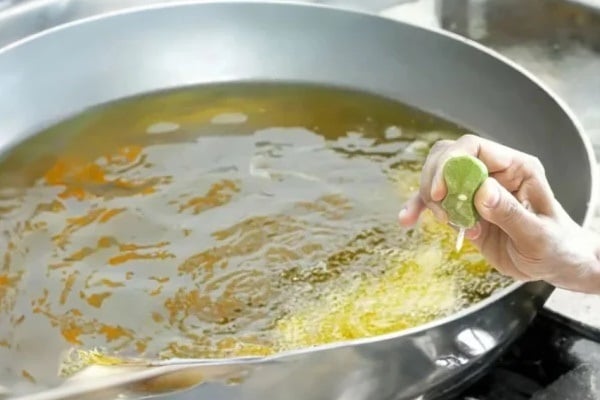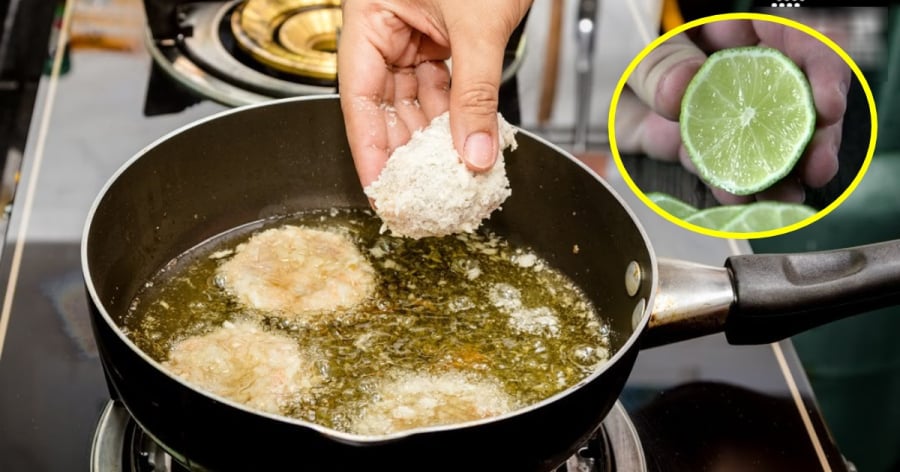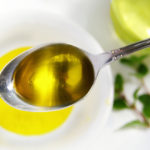Many “kitchen wizards” squeeze a few drops of lemon into the cooking oil when frying. Do you know what the effect of squeezing lemon into the frying oil is?
The effect of squeezing lemon into frying oil
Very few people know that adding a little salt or lemon to the frying oil will help the fried fish become crispy on the outside while remaining tender and juicy on the inside. The dish will have a delicious and fragrant flavor, without being greasy.
The method is very simple: Clean the fish, rub it with salt and marinate for about 30 minutes, then pat dry. Heat a pan on the stove, heat it up and pour in the cooking oil. Then, add a little salt and squeeze a few drops of lemon into the oil. When the oil is hot and no longer sizzling, you can place the dry-marinated fish into it and fry until golden on both sides.

What is the effect of adding salt and squeezing lemon into frying oil? The benefit of this trick is that the fried fish is crispy, golden, and does not stick to the pan. The salt helps prevent oil splatters, while the lemon makes the fish more fragrant and crispy.
However, you should note that you should only fry the fish over medium heat, and add just a little salt, not too much. The fish to be fried must be completely dry.
In addition to fish, when frying other dishes, you can also put a slice of fresh lemon in the hot oil, or rub a piece of lemon on the bottom of the pan for about a minute. You can also add a few drops of lemon extract into the oil before frying the food. Lemon helps make the food not only crispier but also more flavorful, and prevents oil splatters.
Squeezing lemon into the frying oil brings special benefits.
Squeezing some lemon juice or adding a few grains of salt into the frying oil will give the food a crispy outer layer while still keeping it soft, juicy, and preventing oil splatters during frying.
You can also use a slice of fresh lemon to rub all over the pan for about 1 minute before pouring in the cooking oil. Lemon helps prevent sticking, prevents oil splatters, and makes the food crispier.
Tips to avoid oil splatters when frying
– Pat dry the food
Water and oil do not mix. They also have different boiling temperatures. Water boils at 100 degrees Celsius while the boiling temperature of oil is much higher (depending on the type of oil). Therefore, when water meets hot oil, the water quickly evaporates, taking some of the oil up into the air. Therefore, when frying foods such as meat, fish, vegetables, etc., you should drain or dry the food thoroughly before putting it into the frying oil.
Furthermore, coating a thin layer of flour or breadcrumbs on the outside of the food is also a way to absorb excess moisture, making frying easier, reducing oil splatters, and creating a crispy crust for the food.
– Add flour to the hot oil
After the oil has heated up, you can add a little flour (or cornstarch) to the pan and stir it evenly. This layer of flour will prevent the food from sticking to the bottom of the pan and also reduce oil splatters during frying.

– Wait for the pan and oil to heat up
You need to wait for the oil to heat up before putting the food in to fry. This tip helps prevent the food from sticking to the pan and reduces oil splatters. Putting the food into the hot pan will create a crispy and golden crust and prevent the oil from soaking into the food.
To check if the oil is hot enough, you can dip a chopstick into the pan. If you see small bubbles rising at the tip of the chopstick, it means you can put the food into the pan.
– Use a splatter guard
A splatter guard has many small air vents that prevent oil splatters while still allowing steam to escape, helping the food achieve the desired crispiness.
Tips on Selecting Healthy Cooking Oil and Safe Ways to Cook with It
A Taiwanese company has made a significant impact on the food industry through the recycling of over 700 tons of dirty oil, which has been exported to over 12 countries, including Vietnam. This has raised a few eyebrows among housewives, as cooking oil is an essential condiment in daily cooking. To ensure the safety and quality of their cooking oil, consumers should take note of the following advice.



































